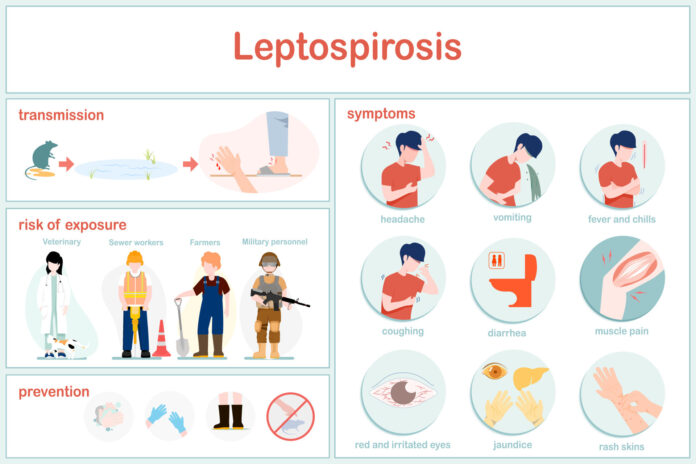Leptospirosis is a bacterial infection caused by the bacteria Leptospira. It is a zoonotic disease, meaning it can be transmitted from animals to humans. It is most commonly found in tropical and subtropical regions, especially in areas with heavy rainfall and poor sanitation.
Overview:
- Transmission: The bacteria can enter the body through mucous membranes, open wounds, or ingestion of contaminated water, soil, or food. It is typically spread through contact with the urine of infected animals, such as rats, cattle, pigs, and dogs.
- Incubation Period: The time from exposure to the appearance of symptoms is usually between 2 and 30 days.
- Populations at Risk: People working with animals (such as farmers and veterinarians) or in environments with contaminated water (such as sewage workers) are at higher risk.
Symptoms:
The symptoms of leptospirosis can vary from mild to severe. Common symptoms include:
- Fever and chills
- Headache
- Muscle aches
- Vomiting
- Diarrhea
- Jaundice (yellowing of the skin and eyes)
- Red eyes (conjunctival suffusion)
- Rash In severe cases, leptospirosis can lead to complications such as kidney damage, meningitis, liver failure, and respiratory distress.
Causes:
- Bacterial Source: Leptospirosis is caused by the bacteria Leptospira, which is often found in the urine of infected animals.
- Exposure: People can contract the infection by coming into contact with contaminated water, soil, or food. Activities like swimming, wading, or working in contaminated environments can increase the risk of exposure.
Treatment:
- Antibiotics: The primary treatment for leptospirosis is antibiotics such as doxycycline or penicillin. Early treatment can help prevent complications and speed up recovery.
- Supportive Care: In severe cases, hospitalization may be necessary for supportive care such as intravenous fluids and dialysis if kidney function is compromised.
- Monitoring: Patients may need to be monitored for potential complications such as liver or kidney damage.
Prevention:
- Avoid Contact: Reduce exposure to potentially contaminated water and soil, especially in areas where leptospirosis is common.
- Protective Gear: Wear protective clothing (gloves, boots) when working with animals or in environments with a risk of exposure.
- Vaccination: In some areas, vaccines are available for animals to reduce the risk of spreading the disease.
- Good Hygiene: Wash hands thoroughly after handling animals or being in potentially contaminated environments.

































